Organizational Behavior Report: Management and Personality Analysis
VerifiedAdded on 2023/04/21
|10
|2081
|343
Report
AI Summary
This report provides an in-depth analysis of organizational behavior, addressing several key aspects. It begins by exploring the implications of high power distance and collectivism in South American cultures when individuals from these backgrounds work in Canada. The report then delves into the five-factor model of personality, identifying and explaining crucial personality traits for sales positions. Furthermore, it critically examines the merits and drawbacks of using stereotypes in the workplace, providing a balanced perspective. Finally, the report concludes by comparing the importance of emotional intelligence versus cognitive intelligence, emphasizing the former's significance in achieving individual and organizational success, supported by real-world examples like the Toronto Police Service.
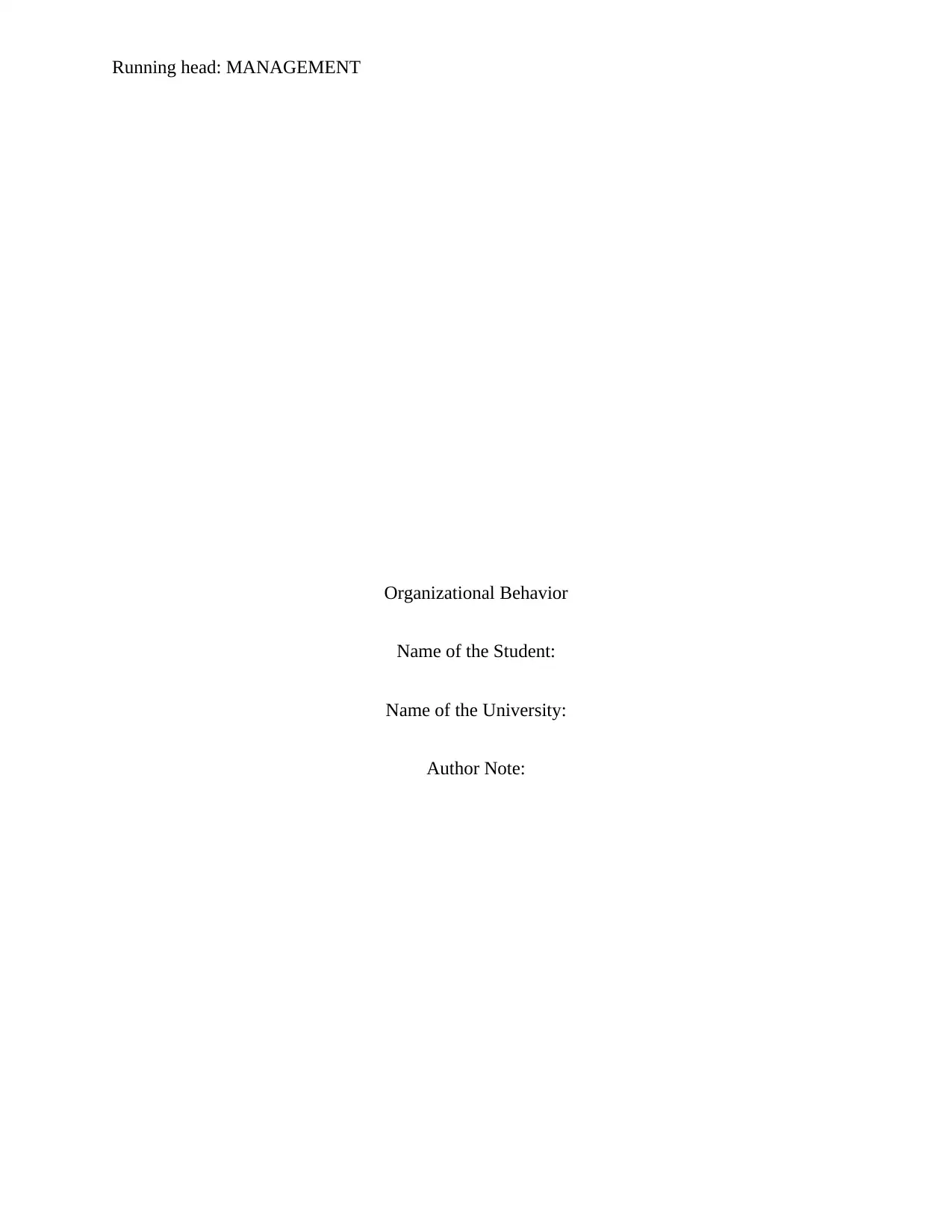
Running head: MANAGEMENT
Organizational Behavior
Name of the Student:
Name of the University:
Author Note:
Organizational Behavior
Name of the Student:
Name of the University:
Author Note:
Paraphrase This Document
Need a fresh take? Get an instant paraphrase of this document with our AI Paraphraser
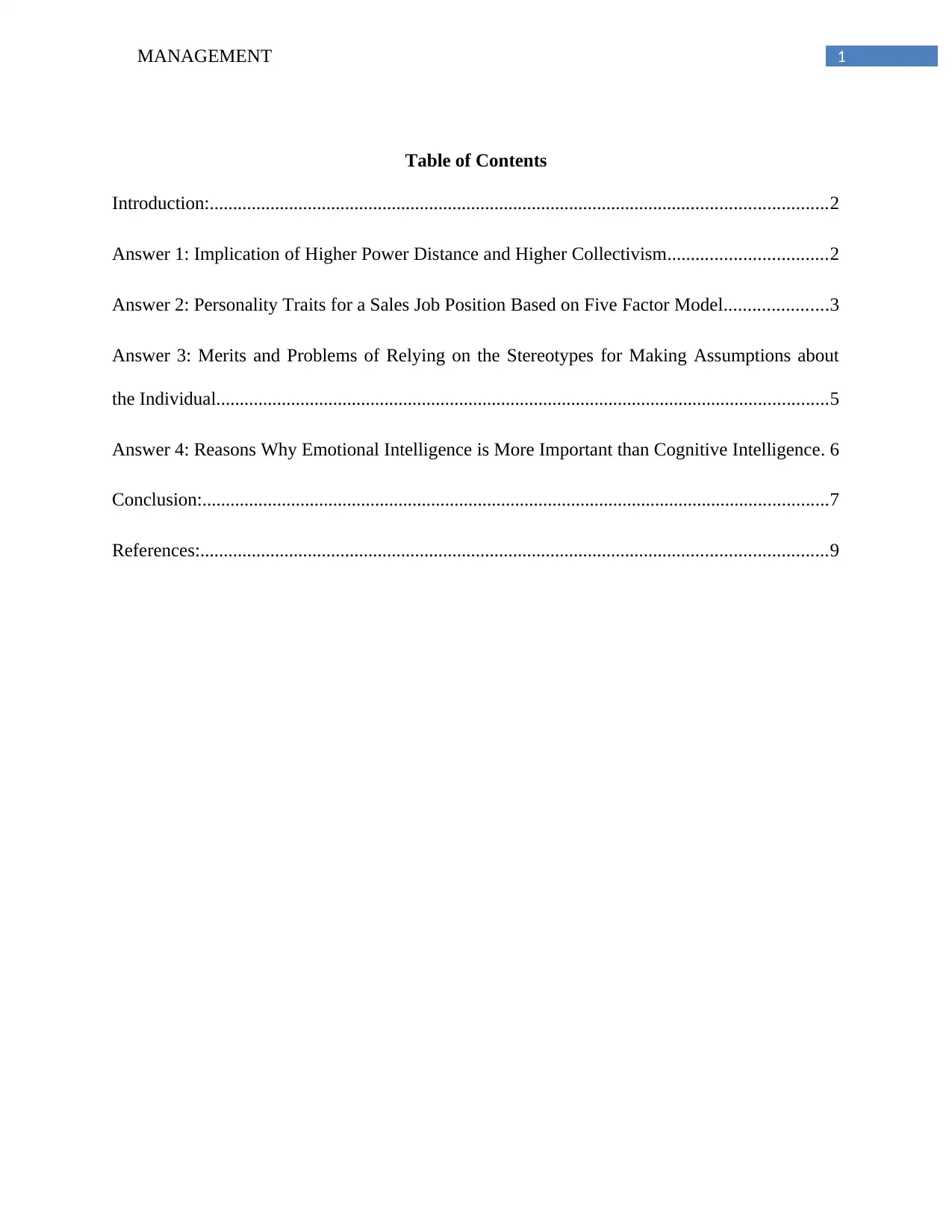
1MANAGEMENT
Table of Contents
Introduction:....................................................................................................................................2
Answer 1: Implication of Higher Power Distance and Higher Collectivism..................................2
Answer 2: Personality Traits for a Sales Job Position Based on Five Factor Model......................3
Answer 3: Merits and Problems of Relying on the Stereotypes for Making Assumptions about
the Individual...................................................................................................................................5
Answer 4: Reasons Why Emotional Intelligence is More Important than Cognitive Intelligence. 6
Conclusion:......................................................................................................................................7
References:......................................................................................................................................9
Table of Contents
Introduction:....................................................................................................................................2
Answer 1: Implication of Higher Power Distance and Higher Collectivism..................................2
Answer 2: Personality Traits for a Sales Job Position Based on Five Factor Model......................3
Answer 3: Merits and Problems of Relying on the Stereotypes for Making Assumptions about
the Individual...................................................................................................................................5
Answer 4: Reasons Why Emotional Intelligence is More Important than Cognitive Intelligence. 6
Conclusion:......................................................................................................................................7
References:......................................................................................................................................9
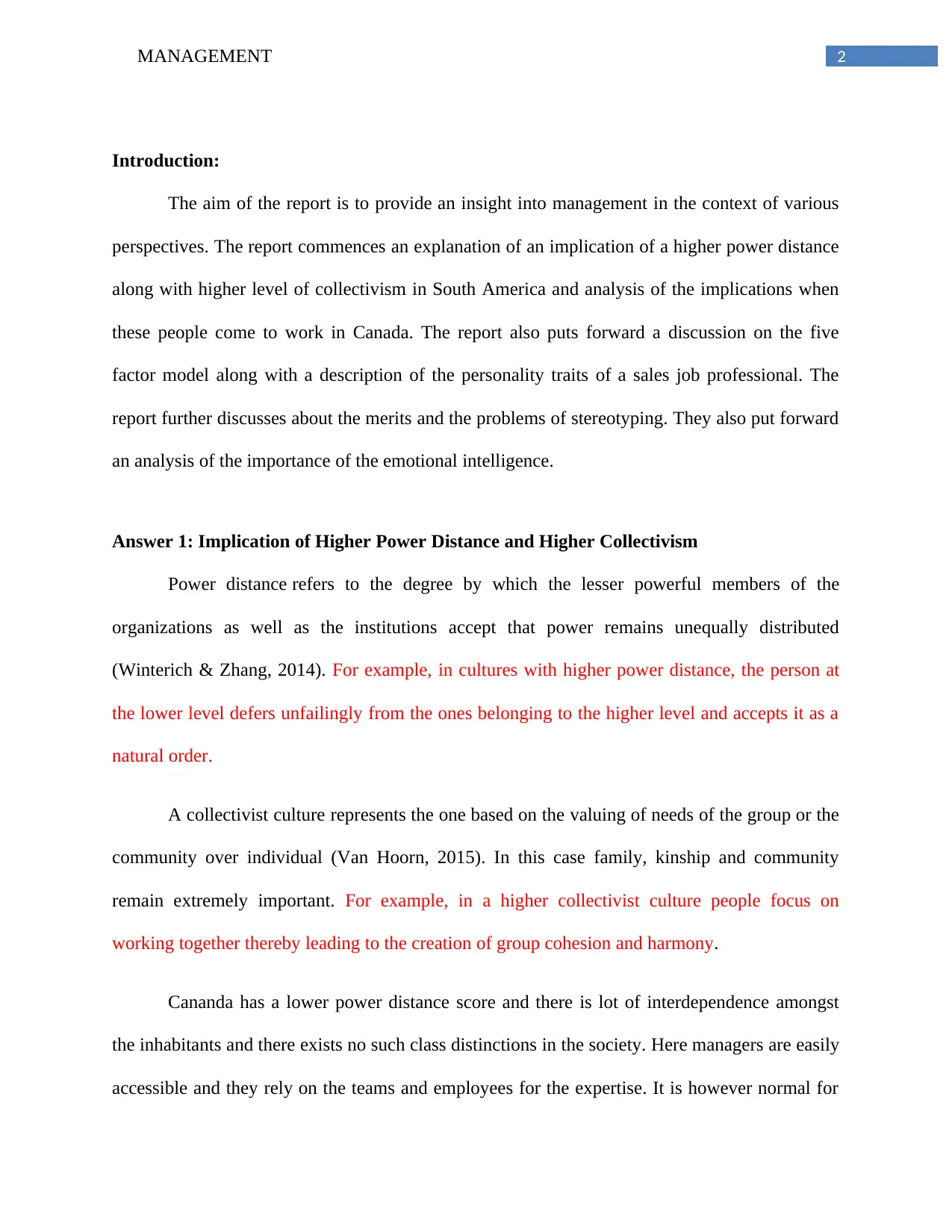
2MANAGEMENT
Introduction:
The aim of the report is to provide an insight into management in the context of various
perspectives. The report commences an explanation of an implication of a higher power distance
along with higher level of collectivism in South America and analysis of the implications when
these people come to work in Canada. The report also puts forward a discussion on the five
factor model along with a description of the personality traits of a sales job professional. The
report further discusses about the merits and the problems of stereotyping. They also put forward
an analysis of the importance of the emotional intelligence.
Answer 1: Implication of Higher Power Distance and Higher Collectivism
Power distance refers to the degree by which the lesser powerful members of the
organizations as well as the institutions accept that power remains unequally distributed
(Winterich & Zhang, 2014). For example, in cultures with higher power distance, the person at
the lower level defers unfailingly from the ones belonging to the higher level and accepts it as a
natural order.
A collectivist culture represents the one based on the valuing of needs of the group or the
community over individual (Van Hoorn, 2015). In this case family, kinship and community
remain extremely important. For example, in a higher collectivist culture people focus on
working together thereby leading to the creation of group cohesion and harmony.
Cananda has a lower power distance score and there is lot of interdependence amongst
the inhabitants and there exists no such class distinctions in the society. Here managers are easily
accessible and they rely on the teams and employees for the expertise. It is however normal for
Introduction:
The aim of the report is to provide an insight into management in the context of various
perspectives. The report commences an explanation of an implication of a higher power distance
along with higher level of collectivism in South America and analysis of the implications when
these people come to work in Canada. The report also puts forward a discussion on the five
factor model along with a description of the personality traits of a sales job professional. The
report further discusses about the merits and the problems of stereotyping. They also put forward
an analysis of the importance of the emotional intelligence.
Answer 1: Implication of Higher Power Distance and Higher Collectivism
Power distance refers to the degree by which the lesser powerful members of the
organizations as well as the institutions accept that power remains unequally distributed
(Winterich & Zhang, 2014). For example, in cultures with higher power distance, the person at
the lower level defers unfailingly from the ones belonging to the higher level and accepts it as a
natural order.
A collectivist culture represents the one based on the valuing of needs of the group or the
community over individual (Van Hoorn, 2015). In this case family, kinship and community
remain extremely important. For example, in a higher collectivist culture people focus on
working together thereby leading to the creation of group cohesion and harmony.
Cananda has a lower power distance score and there is lot of interdependence amongst
the inhabitants and there exists no such class distinctions in the society. Here managers are easily
accessible and they rely on the teams and employees for the expertise. It is however normal for
⊘ This is a preview!⊘
Do you want full access?
Subscribe today to unlock all pages.

Trusted by 1+ million students worldwide
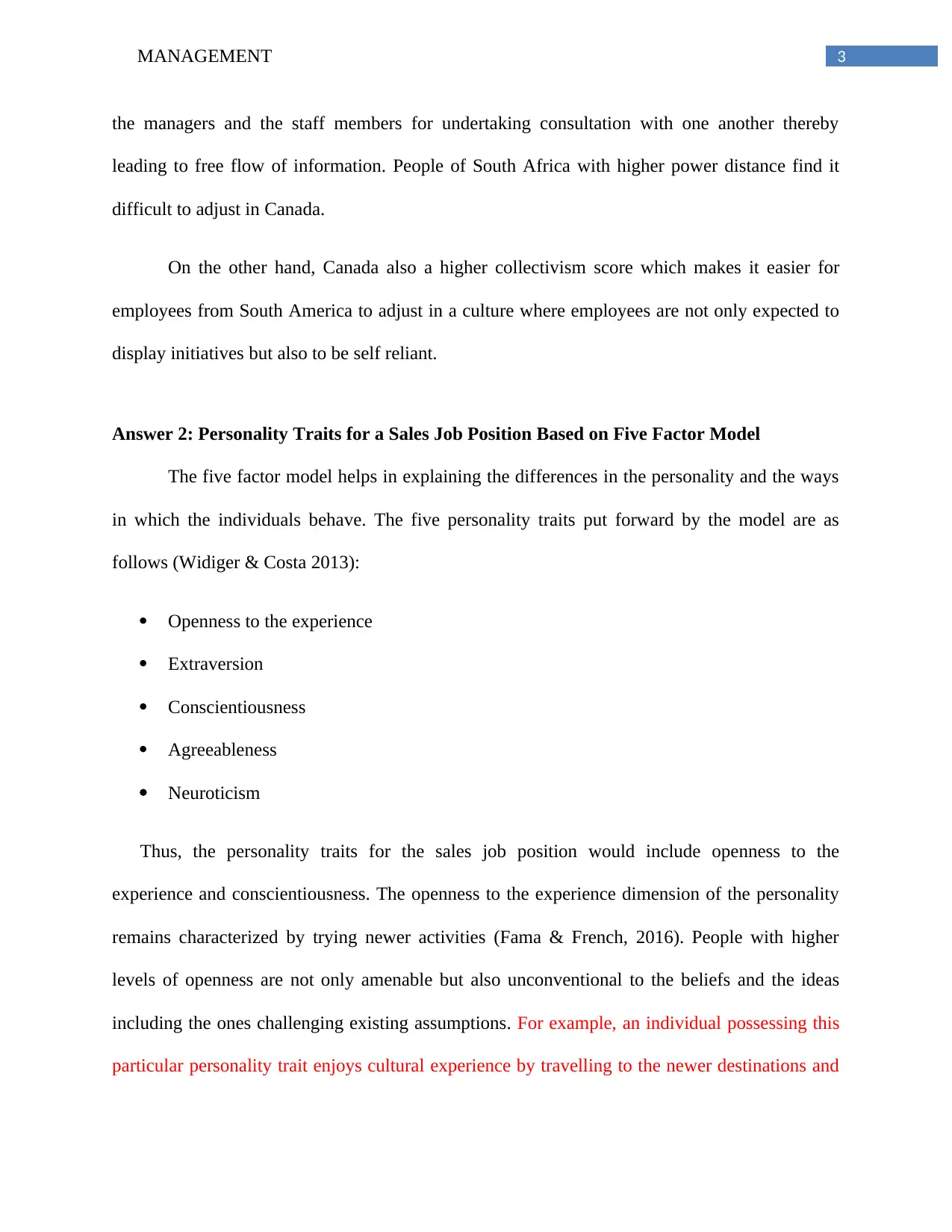
3MANAGEMENT
the managers and the staff members for undertaking consultation with one another thereby
leading to free flow of information. People of South Africa with higher power distance find it
difficult to adjust in Canada.
On the other hand, Canada also a higher collectivism score which makes it easier for
employees from South America to adjust in a culture where employees are not only expected to
display initiatives but also to be self reliant.
Answer 2: Personality Traits for a Sales Job Position Based on Five Factor Model
The five factor model helps in explaining the differences in the personality and the ways
in which the individuals behave. The five personality traits put forward by the model are as
follows (Widiger & Costa 2013):
Openness to the experience
Extraversion
Conscientiousness
Agreeableness
Neuroticism
Thus, the personality traits for the sales job position would include openness to the
experience and conscientiousness. The openness to the experience dimension of the personality
remains characterized by trying newer activities (Fama & French, 2016). People with higher
levels of openness are not only amenable but also unconventional to the beliefs and the ideas
including the ones challenging existing assumptions. For example, an individual possessing this
particular personality trait enjoys cultural experience by travelling to the newer destinations and
the managers and the staff members for undertaking consultation with one another thereby
leading to free flow of information. People of South Africa with higher power distance find it
difficult to adjust in Canada.
On the other hand, Canada also a higher collectivism score which makes it easier for
employees from South America to adjust in a culture where employees are not only expected to
display initiatives but also to be self reliant.
Answer 2: Personality Traits for a Sales Job Position Based on Five Factor Model
The five factor model helps in explaining the differences in the personality and the ways
in which the individuals behave. The five personality traits put forward by the model are as
follows (Widiger & Costa 2013):
Openness to the experience
Extraversion
Conscientiousness
Agreeableness
Neuroticism
Thus, the personality traits for the sales job position would include openness to the
experience and conscientiousness. The openness to the experience dimension of the personality
remains characterized by trying newer activities (Fama & French, 2016). People with higher
levels of openness are not only amenable but also unconventional to the beliefs and the ideas
including the ones challenging existing assumptions. For example, an individual possessing this
particular personality trait enjoys cultural experience by travelling to the newer destinations and
Paraphrase This Document
Need a fresh take? Get an instant paraphrase of this document with our AI Paraphraser
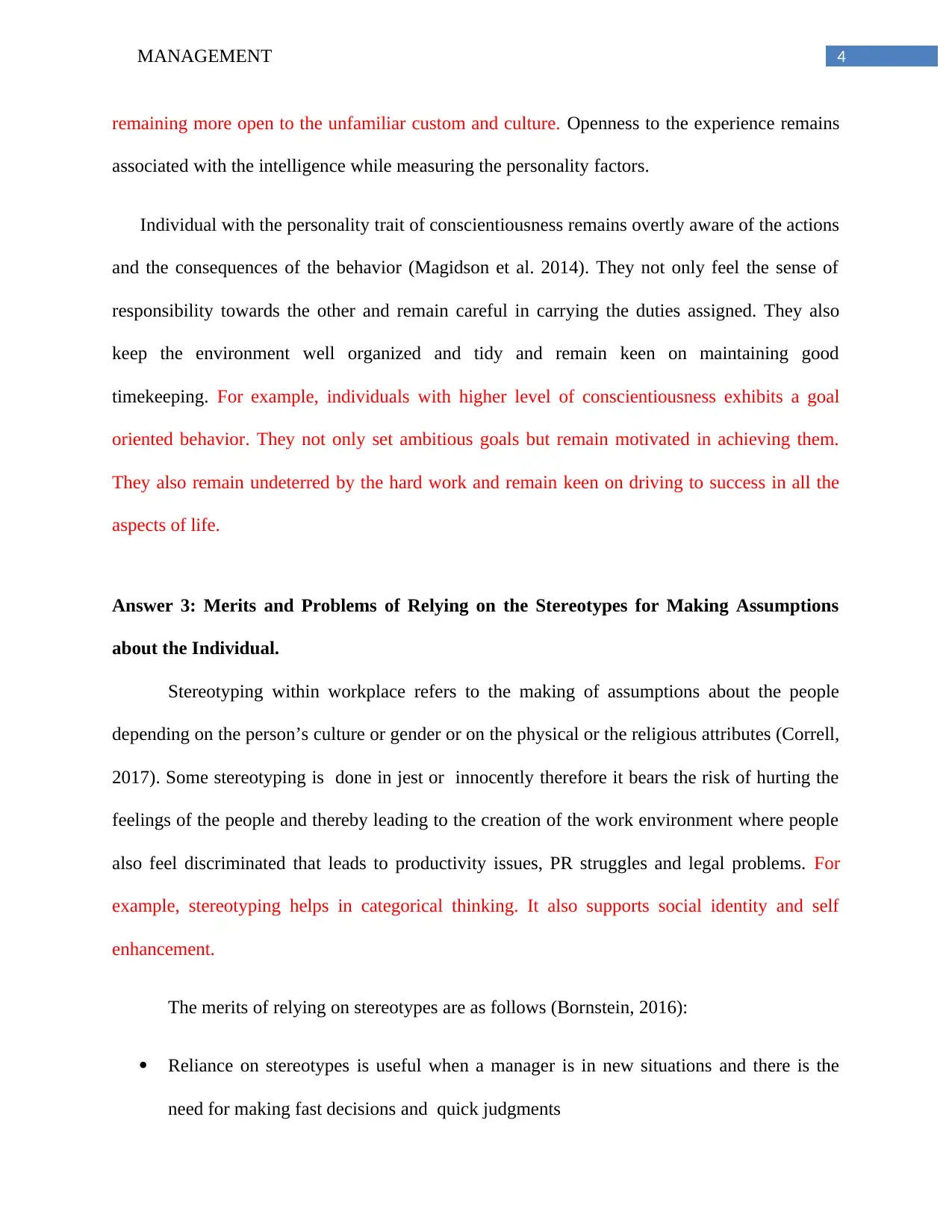
4MANAGEMENT
remaining more open to the unfamiliar custom and culture. Openness to the experience remains
associated with the intelligence while measuring the personality factors.
Individual with the personality trait of conscientiousness remains overtly aware of the actions
and the consequences of the behavior (Magidson et al. 2014). They not only feel the sense of
responsibility towards the other and remain careful in carrying the duties assigned. They also
keep the environment well organized and tidy and remain keen on maintaining good
timekeeping. For example, individuals with higher level of conscientiousness exhibits a goal
oriented behavior. They not only set ambitious goals but remain motivated in achieving them.
They also remain undeterred by the hard work and remain keen on driving to success in all the
aspects of life.
Answer 3: Merits and Problems of Relying on the Stereotypes for Making Assumptions
about the Individual.
Stereotyping within workplace refers to the making of assumptions about the people
depending on the person’s culture or gender or on the physical or the religious attributes (Correll,
2017). Some stereotyping is done in jest or innocently therefore it bears the risk of hurting the
feelings of the people and thereby leading to the creation of the work environment where people
also feel discriminated that leads to productivity issues, PR struggles and legal problems. For
example, stereotyping helps in categorical thinking. It also supports social identity and self
enhancement.
The merits of relying on stereotypes are as follows (Bornstein, 2016):
Reliance on stereotypes is useful when a manager is in new situations and there is the
need for making fast decisions and quick judgments
remaining more open to the unfamiliar custom and culture. Openness to the experience remains
associated with the intelligence while measuring the personality factors.
Individual with the personality trait of conscientiousness remains overtly aware of the actions
and the consequences of the behavior (Magidson et al. 2014). They not only feel the sense of
responsibility towards the other and remain careful in carrying the duties assigned. They also
keep the environment well organized and tidy and remain keen on maintaining good
timekeeping. For example, individuals with higher level of conscientiousness exhibits a goal
oriented behavior. They not only set ambitious goals but remain motivated in achieving them.
They also remain undeterred by the hard work and remain keen on driving to success in all the
aspects of life.
Answer 3: Merits and Problems of Relying on the Stereotypes for Making Assumptions
about the Individual.
Stereotyping within workplace refers to the making of assumptions about the people
depending on the person’s culture or gender or on the physical or the religious attributes (Correll,
2017). Some stereotyping is done in jest or innocently therefore it bears the risk of hurting the
feelings of the people and thereby leading to the creation of the work environment where people
also feel discriminated that leads to productivity issues, PR struggles and legal problems. For
example, stereotyping helps in categorical thinking. It also supports social identity and self
enhancement.
The merits of relying on stereotypes are as follows (Bornstein, 2016):
Reliance on stereotypes is useful when a manager is in new situations and there is the
need for making fast decisions and quick judgments
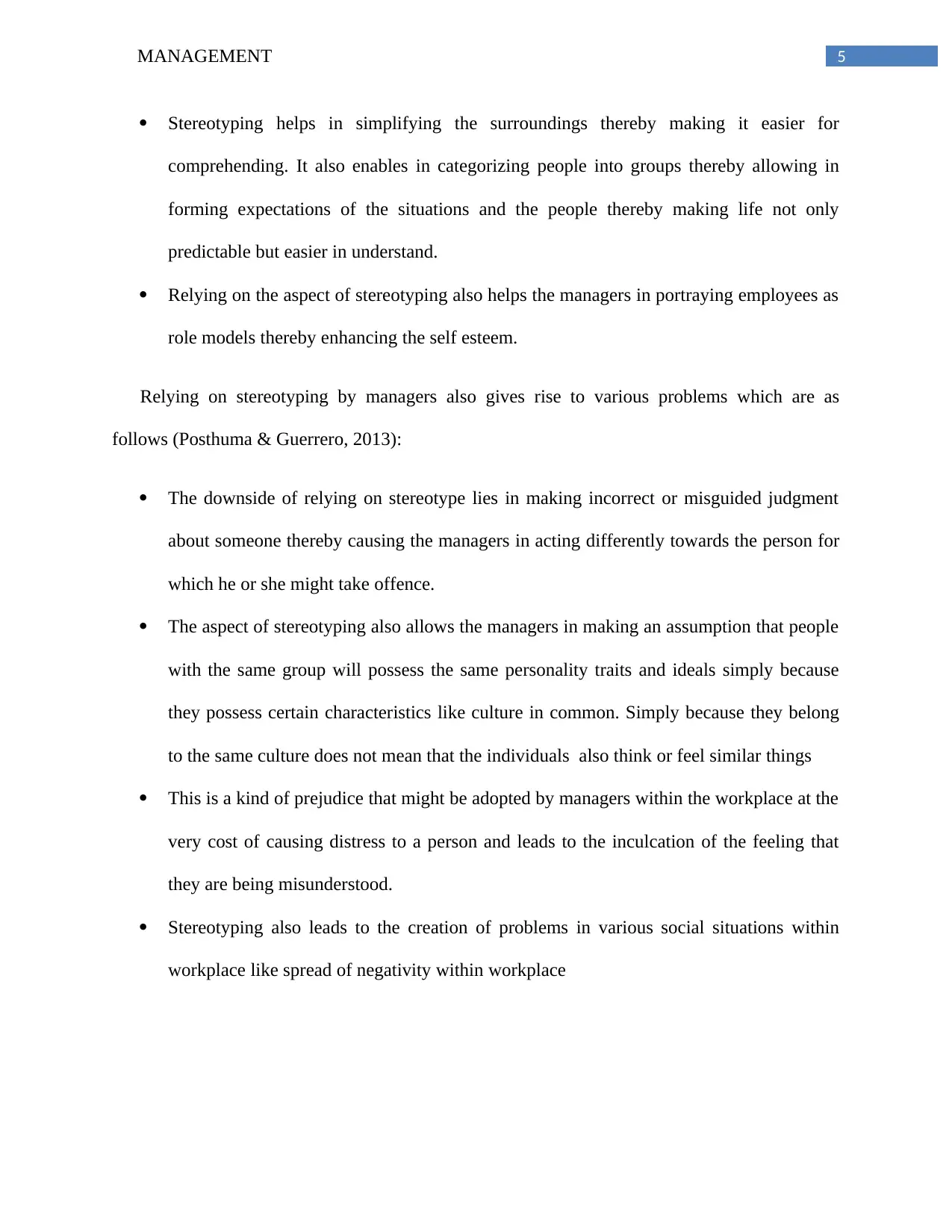
5MANAGEMENT
Stereotyping helps in simplifying the surroundings thereby making it easier for
comprehending. It also enables in categorizing people into groups thereby allowing in
forming expectations of the situations and the people thereby making life not only
predictable but easier in understand.
Relying on the aspect of stereotyping also helps the managers in portraying employees as
role models thereby enhancing the self esteem.
Relying on stereotyping by managers also gives rise to various problems which are as
follows (Posthuma & Guerrero, 2013):
The downside of relying on stereotype lies in making incorrect or misguided judgment
about someone thereby causing the managers in acting differently towards the person for
which he or she might take offence.
The aspect of stereotyping also allows the managers in making an assumption that people
with the same group will possess the same personality traits and ideals simply because
they possess certain characteristics like culture in common. Simply because they belong
to the same culture does not mean that the individuals also think or feel similar things
This is a kind of prejudice that might be adopted by managers within the workplace at the
very cost of causing distress to a person and leads to the inculcation of the feeling that
they are being misunderstood.
Stereotyping also leads to the creation of problems in various social situations within
workplace like spread of negativity within workplace
Stereotyping helps in simplifying the surroundings thereby making it easier for
comprehending. It also enables in categorizing people into groups thereby allowing in
forming expectations of the situations and the people thereby making life not only
predictable but easier in understand.
Relying on the aspect of stereotyping also helps the managers in portraying employees as
role models thereby enhancing the self esteem.
Relying on stereotyping by managers also gives rise to various problems which are as
follows (Posthuma & Guerrero, 2013):
The downside of relying on stereotype lies in making incorrect or misguided judgment
about someone thereby causing the managers in acting differently towards the person for
which he or she might take offence.
The aspect of stereotyping also allows the managers in making an assumption that people
with the same group will possess the same personality traits and ideals simply because
they possess certain characteristics like culture in common. Simply because they belong
to the same culture does not mean that the individuals also think or feel similar things
This is a kind of prejudice that might be adopted by managers within the workplace at the
very cost of causing distress to a person and leads to the inculcation of the feeling that
they are being misunderstood.
Stereotyping also leads to the creation of problems in various social situations within
workplace like spread of negativity within workplace
⊘ This is a preview!⊘
Do you want full access?
Subscribe today to unlock all pages.

Trusted by 1+ million students worldwide
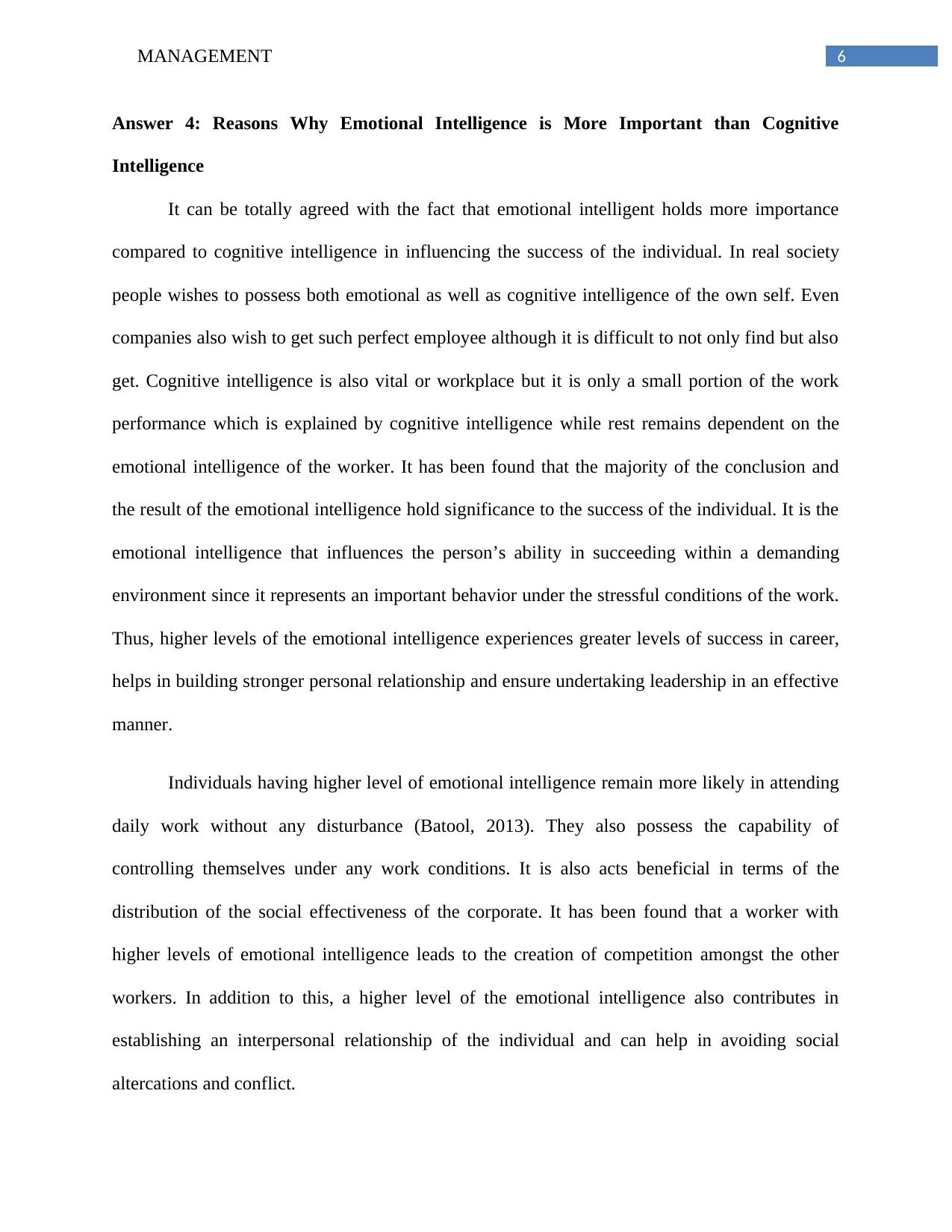
6MANAGEMENT
Answer 4: Reasons Why Emotional Intelligence is More Important than Cognitive
Intelligence
It can be totally agreed with the fact that emotional intelligent holds more importance
compared to cognitive intelligence in influencing the success of the individual. In real society
people wishes to possess both emotional as well as cognitive intelligence of the own self. Even
companies also wish to get such perfect employee although it is difficult to not only find but also
get. Cognitive intelligence is also vital or workplace but it is only a small portion of the work
performance which is explained by cognitive intelligence while rest remains dependent on the
emotional intelligence of the worker. It has been found that the majority of the conclusion and
the result of the emotional intelligence hold significance to the success of the individual. It is the
emotional intelligence that influences the person’s ability in succeeding within a demanding
environment since it represents an important behavior under the stressful conditions of the work.
Thus, higher levels of the emotional intelligence experiences greater levels of success in career,
helps in building stronger personal relationship and ensure undertaking leadership in an effective
manner.
Individuals having higher level of emotional intelligence remain more likely in attending
daily work without any disturbance (Batool, 2013). They also possess the capability of
controlling themselves under any work conditions. It is also acts beneficial in terms of the
distribution of the social effectiveness of the corporate. It has been found that a worker with
higher levels of emotional intelligence leads to the creation of competition amongst the other
workers. In addition to this, a higher level of the emotional intelligence also contributes in
establishing an interpersonal relationship of the individual and can help in avoiding social
altercations and conflict.
Answer 4: Reasons Why Emotional Intelligence is More Important than Cognitive
Intelligence
It can be totally agreed with the fact that emotional intelligent holds more importance
compared to cognitive intelligence in influencing the success of the individual. In real society
people wishes to possess both emotional as well as cognitive intelligence of the own self. Even
companies also wish to get such perfect employee although it is difficult to not only find but also
get. Cognitive intelligence is also vital or workplace but it is only a small portion of the work
performance which is explained by cognitive intelligence while rest remains dependent on the
emotional intelligence of the worker. It has been found that the majority of the conclusion and
the result of the emotional intelligence hold significance to the success of the individual. It is the
emotional intelligence that influences the person’s ability in succeeding within a demanding
environment since it represents an important behavior under the stressful conditions of the work.
Thus, higher levels of the emotional intelligence experiences greater levels of success in career,
helps in building stronger personal relationship and ensure undertaking leadership in an effective
manner.
Individuals having higher level of emotional intelligence remain more likely in attending
daily work without any disturbance (Batool, 2013). They also possess the capability of
controlling themselves under any work conditions. It is also acts beneficial in terms of the
distribution of the social effectiveness of the corporate. It has been found that a worker with
higher levels of emotional intelligence leads to the creation of competition amongst the other
workers. In addition to this, a higher level of the emotional intelligence also contributes in
establishing an interpersonal relationship of the individual and can help in avoiding social
altercations and conflict.
Paraphrase This Document
Need a fresh take? Get an instant paraphrase of this document with our AI Paraphraser
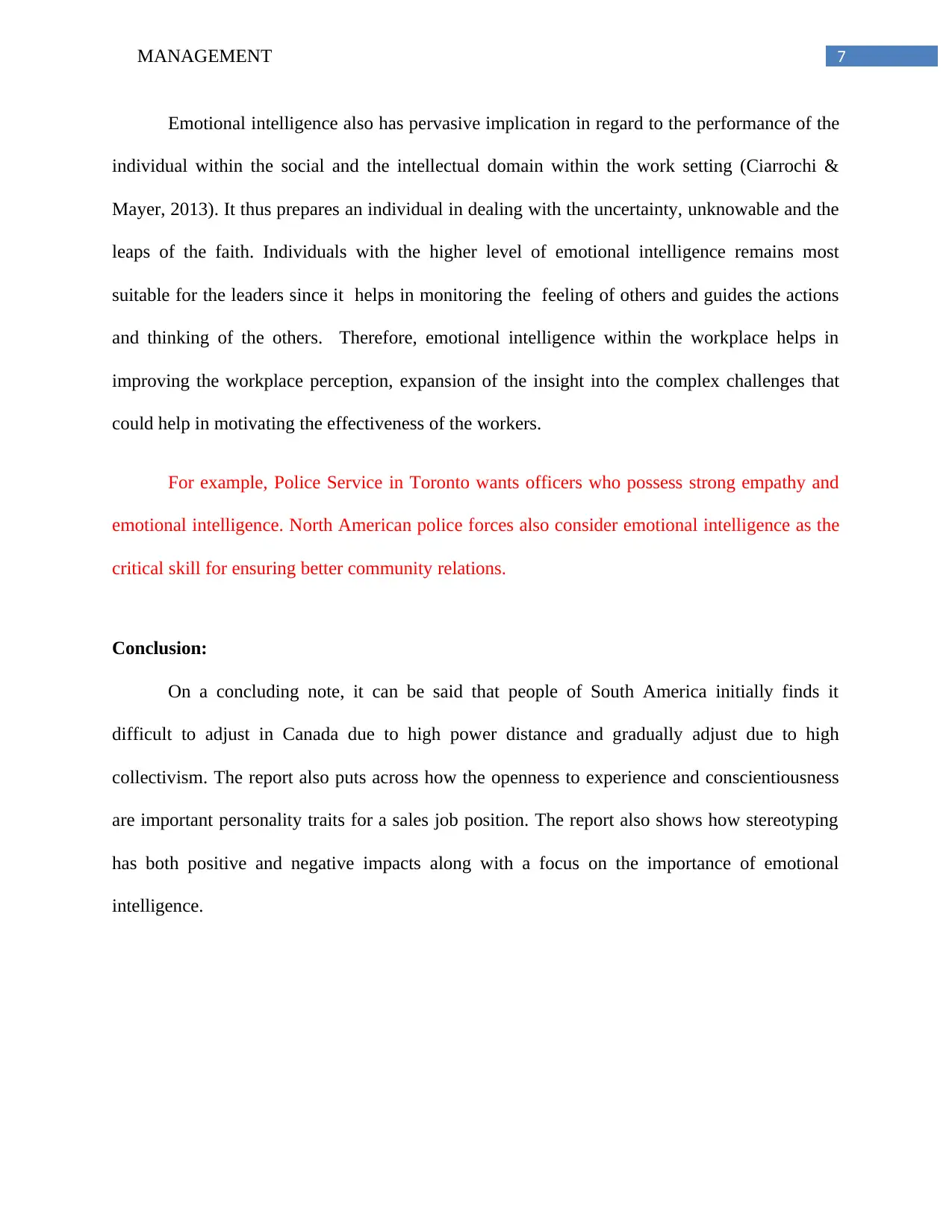
7MANAGEMENT
Emotional intelligence also has pervasive implication in regard to the performance of the
individual within the social and the intellectual domain within the work setting (Ciarrochi &
Mayer, 2013). It thus prepares an individual in dealing with the uncertainty, unknowable and the
leaps of the faith. Individuals with the higher level of emotional intelligence remains most
suitable for the leaders since it helps in monitoring the feeling of others and guides the actions
and thinking of the others. Therefore, emotional intelligence within the workplace helps in
improving the workplace perception, expansion of the insight into the complex challenges that
could help in motivating the effectiveness of the workers.
For example, Police Service in Toronto wants officers who possess strong empathy and
emotional intelligence. North American police forces also consider emotional intelligence as the
critical skill for ensuring better community relations.
Conclusion:
On a concluding note, it can be said that people of South America initially finds it
difficult to adjust in Canada due to high power distance and gradually adjust due to high
collectivism. The report also puts across how the openness to experience and conscientiousness
are important personality traits for a sales job position. The report also shows how stereotyping
has both positive and negative impacts along with a focus on the importance of emotional
intelligence.
Emotional intelligence also has pervasive implication in regard to the performance of the
individual within the social and the intellectual domain within the work setting (Ciarrochi &
Mayer, 2013). It thus prepares an individual in dealing with the uncertainty, unknowable and the
leaps of the faith. Individuals with the higher level of emotional intelligence remains most
suitable for the leaders since it helps in monitoring the feeling of others and guides the actions
and thinking of the others. Therefore, emotional intelligence within the workplace helps in
improving the workplace perception, expansion of the insight into the complex challenges that
could help in motivating the effectiveness of the workers.
For example, Police Service in Toronto wants officers who possess strong empathy and
emotional intelligence. North American police forces also consider emotional intelligence as the
critical skill for ensuring better community relations.
Conclusion:
On a concluding note, it can be said that people of South America initially finds it
difficult to adjust in Canada due to high power distance and gradually adjust due to high
collectivism. The report also puts across how the openness to experience and conscientiousness
are important personality traits for a sales job position. The report also shows how stereotyping
has both positive and negative impacts along with a focus on the importance of emotional
intelligence.
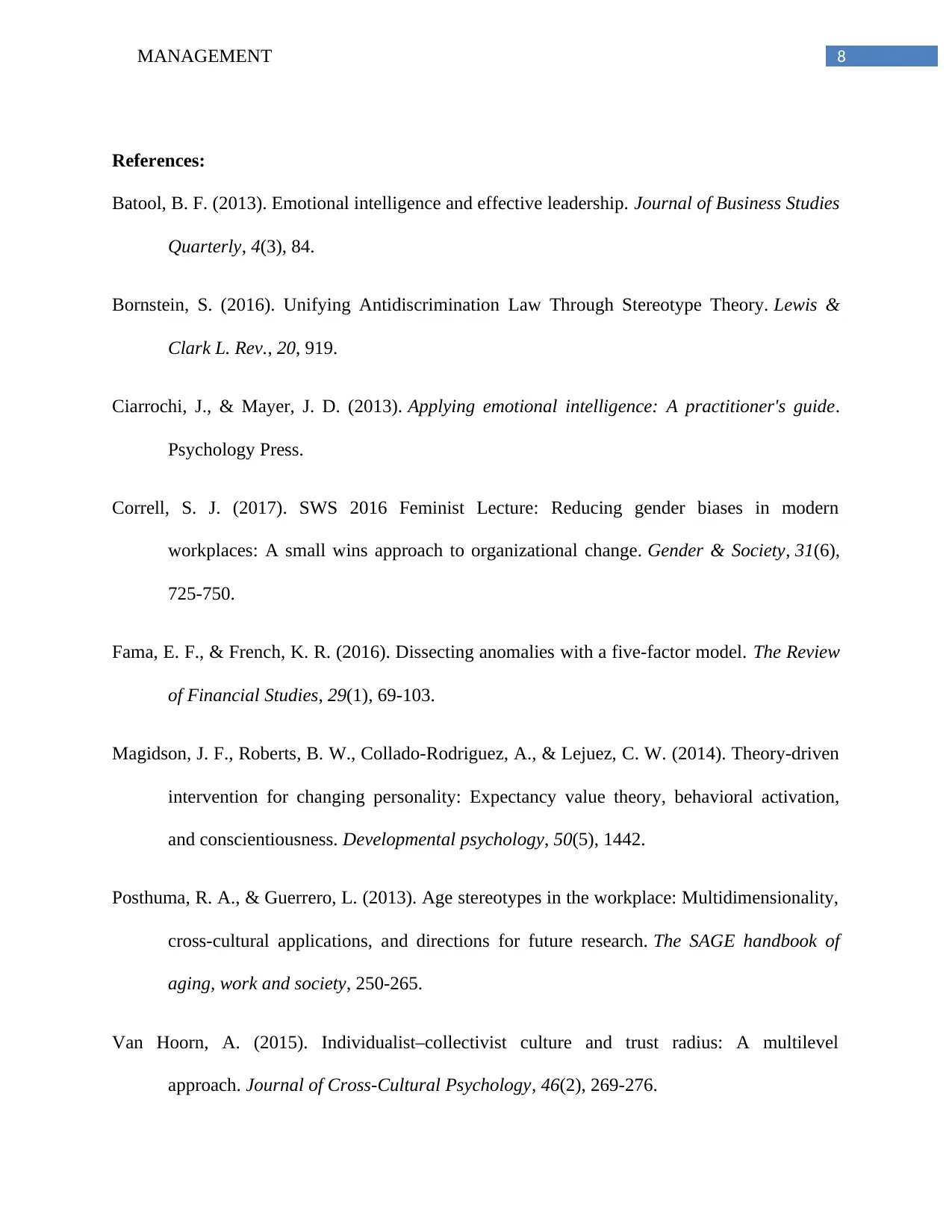
8MANAGEMENT
References:
Batool, B. F. (2013). Emotional intelligence and effective leadership. Journal of Business Studies
Quarterly, 4(3), 84.
Bornstein, S. (2016). Unifying Antidiscrimination Law Through Stereotype Theory. Lewis &
Clark L. Rev., 20, 919.
Ciarrochi, J., & Mayer, J. D. (2013). Applying emotional intelligence: A practitioner's guide.
Psychology Press.
Correll, S. J. (2017). SWS 2016 Feminist Lecture: Reducing gender biases in modern
workplaces: A small wins approach to organizational change. Gender & Society, 31(6),
725-750.
Fama, E. F., & French, K. R. (2016). Dissecting anomalies with a five-factor model. The Review
of Financial Studies, 29(1), 69-103.
Magidson, J. F., Roberts, B. W., Collado-Rodriguez, A., & Lejuez, C. W. (2014). Theory-driven
intervention for changing personality: Expectancy value theory, behavioral activation,
and conscientiousness. Developmental psychology, 50(5), 1442.
Posthuma, R. A., & Guerrero, L. (2013). Age stereotypes in the workplace: Multidimensionality,
cross-cultural applications, and directions for future research. The SAGE handbook of
aging, work and society, 250-265.
Van Hoorn, A. (2015). Individualist–collectivist culture and trust radius: A multilevel
approach. Journal of Cross-Cultural Psychology, 46(2), 269-276.
References:
Batool, B. F. (2013). Emotional intelligence and effective leadership. Journal of Business Studies
Quarterly, 4(3), 84.
Bornstein, S. (2016). Unifying Antidiscrimination Law Through Stereotype Theory. Lewis &
Clark L. Rev., 20, 919.
Ciarrochi, J., & Mayer, J. D. (2013). Applying emotional intelligence: A practitioner's guide.
Psychology Press.
Correll, S. J. (2017). SWS 2016 Feminist Lecture: Reducing gender biases in modern
workplaces: A small wins approach to organizational change. Gender & Society, 31(6),
725-750.
Fama, E. F., & French, K. R. (2016). Dissecting anomalies with a five-factor model. The Review
of Financial Studies, 29(1), 69-103.
Magidson, J. F., Roberts, B. W., Collado-Rodriguez, A., & Lejuez, C. W. (2014). Theory-driven
intervention for changing personality: Expectancy value theory, behavioral activation,
and conscientiousness. Developmental psychology, 50(5), 1442.
Posthuma, R. A., & Guerrero, L. (2013). Age stereotypes in the workplace: Multidimensionality,
cross-cultural applications, and directions for future research. The SAGE handbook of
aging, work and society, 250-265.
Van Hoorn, A. (2015). Individualist–collectivist culture and trust radius: A multilevel
approach. Journal of Cross-Cultural Psychology, 46(2), 269-276.
⊘ This is a preview!⊘
Do you want full access?
Subscribe today to unlock all pages.

Trusted by 1+ million students worldwide
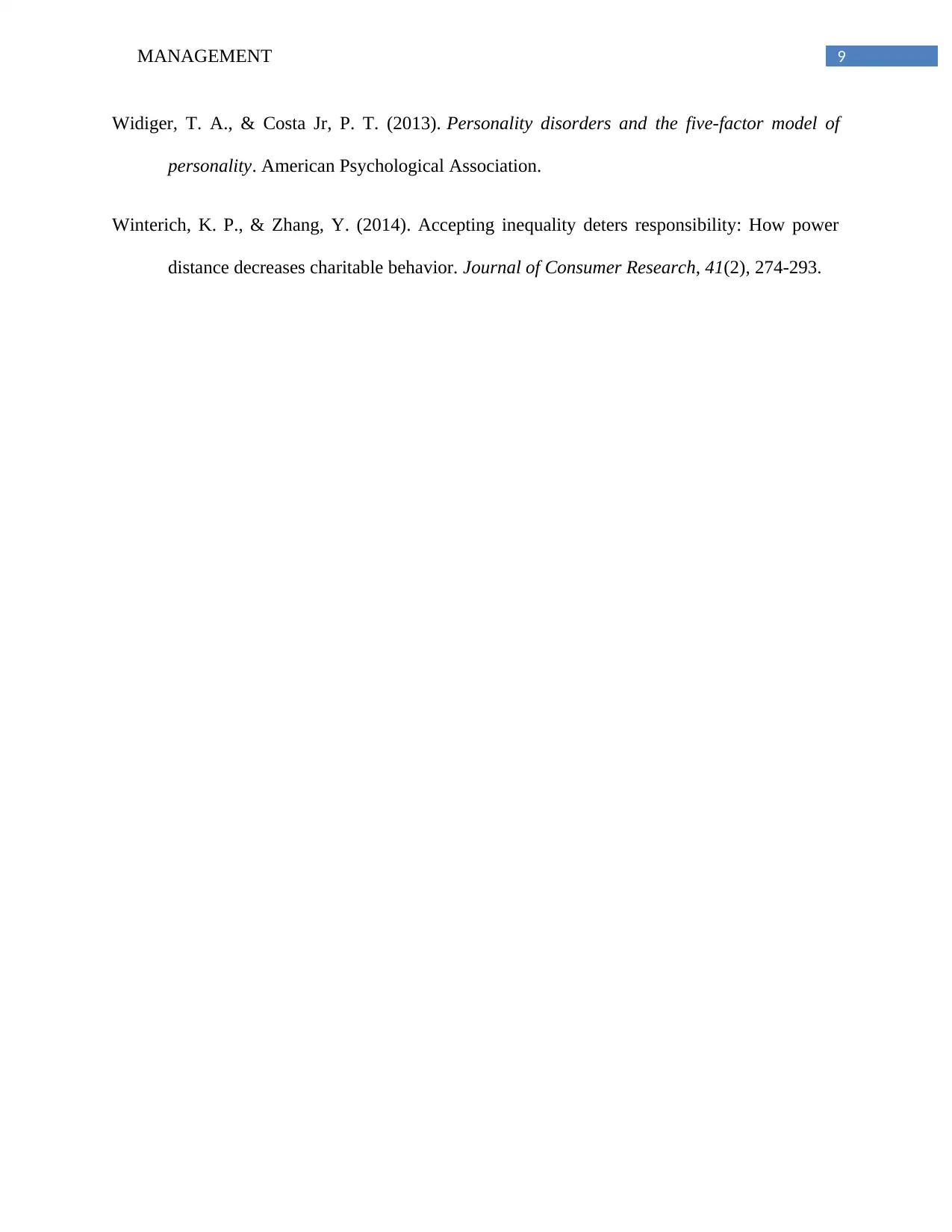
9MANAGEMENT
Widiger, T. A., & Costa Jr, P. T. (2013). Personality disorders and the five-factor model of
personality. American Psychological Association.
Winterich, K. P., & Zhang, Y. (2014). Accepting inequality deters responsibility: How power
distance decreases charitable behavior. Journal of Consumer Research, 41(2), 274-293.
Widiger, T. A., & Costa Jr, P. T. (2013). Personality disorders and the five-factor model of
personality. American Psychological Association.
Winterich, K. P., & Zhang, Y. (2014). Accepting inequality deters responsibility: How power
distance decreases charitable behavior. Journal of Consumer Research, 41(2), 274-293.
1 out of 10
Your All-in-One AI-Powered Toolkit for Academic Success.
+13062052269
info@desklib.com
Available 24*7 on WhatsApp / Email
![[object Object]](/_next/static/media/star-bottom.7253800d.svg)
Unlock your academic potential
Copyright © 2020–2026 A2Z Services. All Rights Reserved. Developed and managed by ZUCOL.

